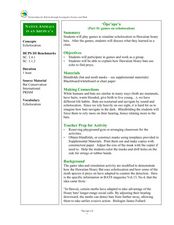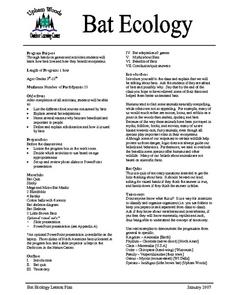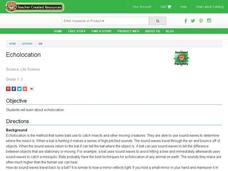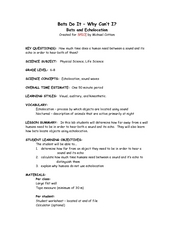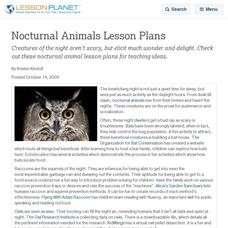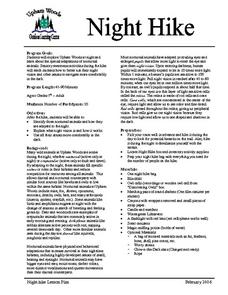Discovery Education
Sonar & Echolocation
A well-designed, comprehensive, and attractive slide show supports direct instruction on how sonar and echolocation work. Contained within the slides are links to interactive websites and instructions for using apps on a mobile device to...
Curated OER
Games on Echolocation
Get a little batty with life science! This fun simulation game replicates how bats use echolocation to hunt moths in their native Hawaiian habitat. After creating blind folds and discussing some basic principles of echolocation, students...
Curated OER
Bat Ecology
Students, through hands on games and activities, discover how bats live and how bats benefit ecosystems. They play a game designed to show them how echolocation works and another to show how mother bats locate their young through their...
Curated OER
Echolocation
Students explore echolocation. In this bats science lesson, students compare sunlight reflecting off a mirror to sound waves hitting a bat's ears. Students complete a worksheet about bats.
Curated OER
Bat Program
Young scholars, through hands on games and activities, discover how bats live and how bats benefit ecosystems. They play a game designed to show them how echolocation works. They take a quiz to dispel some of the myths associated with bats.
K12 Reader
They See with Their Ears
Sometimes bats get a bad rap, even though they are fascinating creatures! Teach your class about echolocation with a reading passage. After reading, class members respond to five questions based on the text.
Curated OER
Bats are Our Buddies!
In this bats worksheet, students click on the links in the questions about bats to find the answers to the questions and then come back and answer the questions. Students answer 19 questions total.
Curated OER
Bats Do It-Why Can't I?
Students explore echos and how they are utilised in navigation. For this sound lesson students calculate the amount of time between a sound and its echo.
Jessica Winston
Magic School Bus Going Batty
Have a scary adventure with a set of reading activities based on Joanna Cole's The Magic School Bus Going Batty! Several worksheets encourage kids to predict what they will learn with a KWL chart, examine the new vocabulary words from...
Curated OER
Bats: Fact and Fiction
Students describe the characteristics and behaviors of bats. After viewing a video, they explain how bats use echolocation to navigate and how they find their young within a group. They list four misconceptions about the animal and...
Curated OER
Brillant, Beautiful Bats!
Students use the internet to gather information on bats. They write their own bat poem and describe the differences between the parts of a bat's body. They identify how bats are important to humans and how they control the insect...
Curated OER
Bats Migrate South
Students examine the life of bats in Illinois. Using the internet, they research the history of the bat in Illinois and describe the way they find prey by using echolocation. They report their findings to the class and answer any...
Curated OER
We're Batty
Young scholars watch a video about bats and compare and contrast them to birds. They identify the specific characteristics that identify bats as mammals and what makes them unique from other mammals.
Curated OER
guided reading lesson using BATS
Students answer questions, then after reading several bat books, students revisit the questions.
Curated OER
Nocturnal Animals Cloze Activity
In this science cloze activity, 3rd graders fill in the 9 blanks in a selection about nocturnal animals. They use the words from a word bank at the bottom of the page to complete the paragraph. They cut out pictures of nocturnal animals...
Curated OER
Hunting For Bats
Fourth graders investigate the adaptations that occur in bats. The benefits of adaptations are discussed with them and the probability of survival is measured. The specific adaptations are written and defined.
Curated OER
Connect the Dots
In this connect the dot worksheet, students connect the dots to reveal a flying mammal that uses radar-like echolocation to find its way around in the dark.
Curated OER
Nocturnal Animals
In this animal worksheet, learners complete a cloze activity about nocturnal animals by filling in the blanks in 2 paragraphs using 9 words from a word bank. They color and cut out 13 small pictures of nocturnal animals and paste them in...
Curated OER
Come to Mommy
Fourth graders participate in a simple experiment to illustrate the concept of mother bats identifying their young. They sniff stickers in order to imitate the behavior of mother bats in the wild.
Curated OER
Echo Location
Students participate in a role-playing activity that demonstrates how whales use sound as an adaptation to their environment.
Curated OER
What Shape Is It?
Students predict the shape of an unknown object by bouncing a ball on it. In this physics lesson, students relate this activity to how dolphins use echo-location to navigate. They analyze their lab result and discuss findings.
Curated OER
Nocturnal Animals Lesson Plans
Creatures of the night aren't scary, but elicit much wonder and delight. Check out these nocturnal animal lesson plans for teaching ideas.
Curated OER
Night Hike
Young scholars explore Upham Woods at night and investigate about the special adaptations of nocturnal animals. They identify three nocturnal animals and how they are adapted to the night. Students explain what night vision is and how it...



